综合英语教程4unit1ppt课件
- 格式:ppt
- 大小:404.50 KB
- 文档页数:28
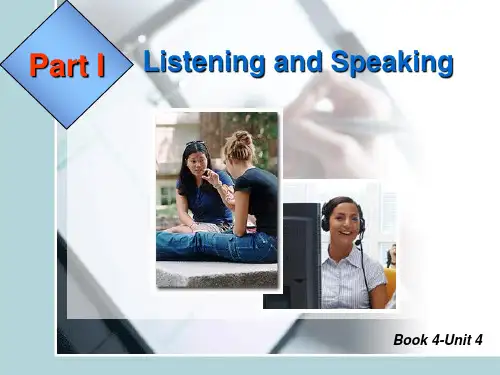
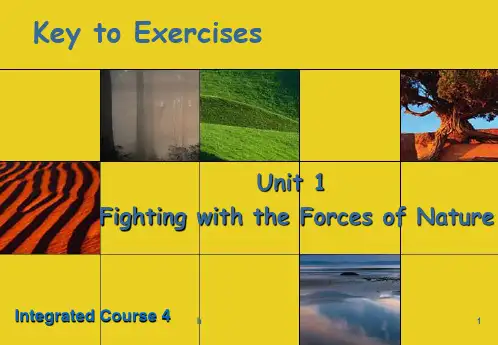
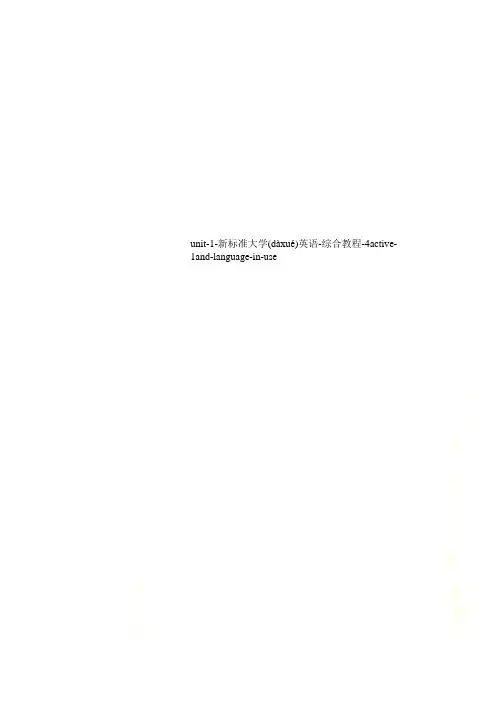
unit-1-新标准大学(dàxué)英语-综合教程-4active-1and-language-in-useunit-1-新标准大学英语-综合(zōnghé)教程-4active-1and-language-in-useunit 1active 1 Your answerCorrect answer 1. proceed proceed 2. transition transition 3. detached detached 4. upcoming upcoming 5. slump slump 6. revertrevert7.recount recountYour answer Correct answer (1)transition transition (2)slumped slumped (3)proceed proceed (4)recounting recounting (5)detached detached (6)upcomingupcomingansweranswer(7)revertrevertI went to a mixed-ability secondary school just outside London. Your replacement:Your answer Correct answercomprehensive comprehensive2.I got stopped by a policeman who asked to see my driving licence. Your replacement:Your answer Correct answercop cop3.Have you seen this beautiful view of Oxford from the air?Your replacement:Your answer Correct answeraerialaerial view of Oxford4.Isabel held her bag tightly as she walked down the corridor towards the office. Your replacement:Your answer Correct answeranswer answerclutched clutched5. You should speak to Toby; he's a supporterof flexible working hours.Your replacement:Your answer Correct answeradvocate an advocate6. I hurt my leg badly a couple of months ago,and it still hasn't got better completely.Your replacement:Your answer Correct answerhealed healed1. A dead-end job is one with ________.(a)exciting prospects(b)no future2. A tricky problem is ________ to solve.(a difficultanswer answer)(b)easy3. If an activity saps all your energy, you feel________.(a)tired(b)more active than usual4. A pushy person tries to ________.(a ) persuade you to do something you don't want to(b ) help you by listening to what you have to sayanswer answer5. If you feel apathy, you want to ________.(a)change the world(b)stay at home and do nothing1 . Fork out is ________ way of saying to pay for something.(a)a formal(b)an informal2 . If you are in the same boat as another person, you are ________.(a making the same journey togetheranswer answer)(b ) in the same difficult or unpleasant situation3 . If you feel you have come full circle, you ________.(a)feel you are back where you started(b)feel a sense of satisfaction becauseyou have completed something4 . If someone takes a soft line, they deal with a person ________.(a)in a kind and sympathetic way(b in a lazy way without making aansweranswer) decision5. If you strike the right note about something, you are expressing yourself ________.(a )well(b )badly6. If you do something by all means , you ________.(a )try your best to do it(b )not care about it7If you nudge someone back into the saddle,answeranswer. you are encouraging them to ________.(a )take responsibility again(b )take it easy8. If you talk through a problem with someone, you ________.(a )examine it carefully and sensitively(b ) refer to it quickly and then change the subjectLanguage in use 1.a degree which is awarded afirst classYour answerSuggestedanswera first-class degree a first-class degree2.work in a hospitalYour answer Suggested answerhospital work hospital work3.a ticket for a plane journeyYour answer Suggested answera plane ticket a plane ticket4.a discount for studentsYour answer Suggested answera student discount a student discount5. a pass which allows you totravel on busesYour answer Suggested answera bus pass a bus pass6. a room where an interview isheldYour answer Suggested answeran interview room an interview room7.a period spent in trainingYour answer Suggested answera training period a training period1. a career which is rewardingfrom the financial point of viewYour answer Suggested answera financially rewarding career a financially rewarding career2. legislation which has beenintroduced recentlyYour answer Suggested answerrecently introduced legislation recently introduced legislation3. instructions which are morecomplex than usualYour answer Suggested answerunusually complex unusually complexinstructions instructions4.an institution which isorientated towards academicYour answerSuggested answeracademicallyorientatedworkanacademicallyorientatedinstitution5.work which makes physicaldemands on youYour answerSuggestedanswerphysically demanding workphysicallydemanding work6.information which has thepotential to be importantYour answer Suggested answerpotentially important information potentially important information7. candidates who have beenselected after a carefulprocedureYour answer Suggested answercarefully selected candidates carefully selected candidates8. a coursebook in whicheverything has been plannedbeautifullyYour answer Suggested answera beautifully a beautifullyplanned textbook planned coursebook1. I'm trying to fill this last page, but I just can't think ofanything.Suggested answer:Try as I might to fill this last page, I just can't think of anything.2. I try to be friendly with Marta, but she doesn't seem torespond.Suggested answer:Try as I might to be friendly with Marta, she doesn't seem to respond.3. I try hard to get tosleep, but I can't help thinking about myfamily.Suggested answer:Try as I might to get to sleep, I can't help thinking about my family.4. He just doesn't seem to get the promotion he deserves, even though he keepstrying.Suggested answer:Keep trying as he might, he just doesn't seem to get the promotion he deserves. / Keep trying as he might to get the promotion he deserves,he just doesn't seem toget it.5. I keep trying toremember her name, butmy mind is ablank.Suggested answer:Keep trying as I might toremember her name, mymind is a blank.1. Since I know several languages, I thought I would look for work abroad.Suggested answer:Given that I know several languages, I thought I would look for work abroad.2. Xiao Li has the best qualifications, so she should get the job.Suggested answer:Given that Xiao Li has the best qualifications, she should get the job.3. Since we're all here, I think it would be a goodidea to get down to some work.Suggested answer:Given that we're all here, I think it would be a good idea to get down to some work.4. Since it's rather late, I think we should leave this last task until tomorrow.Suggested answer:Given that it's rather late, I think we should leave this last task until tomorrow.1. She's experienced at giving advice. I'm more experienced.Suggested answer:I'm more experienced at giving advice than is she.2. You eat too much chocolate. It isn't good foryou.Suggested answer:You eat too more chocolate than is good for you.3. She worked very hard. Most part-timers don't work so hard.Suggested answer:She worked harder than do most part-timers. 4. You have arrived late too many times. That isn't acceptable.Suggested answer:You have arrived late too more times than is acceptable.5. I don't think you should have given so muchpersonal information. It isn'twise.Suggested answer:I think you have given more personal information than is wise.内容总结(1)unit-1-新标准大学英语-综合教程-4active-1and-language-in-use。
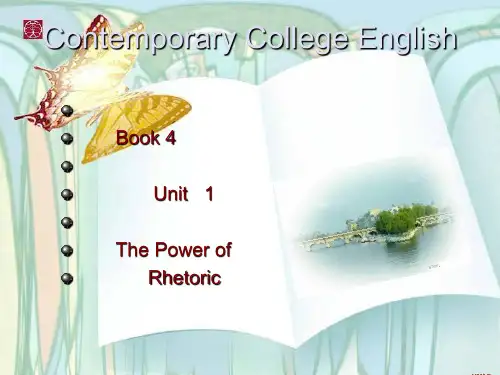

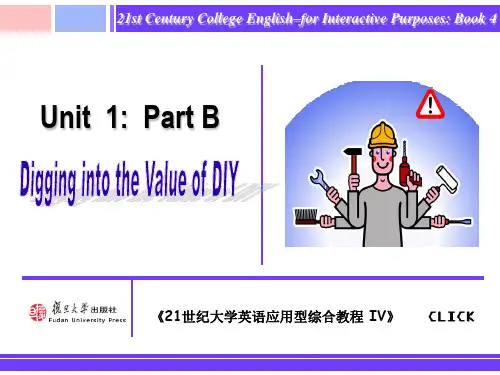
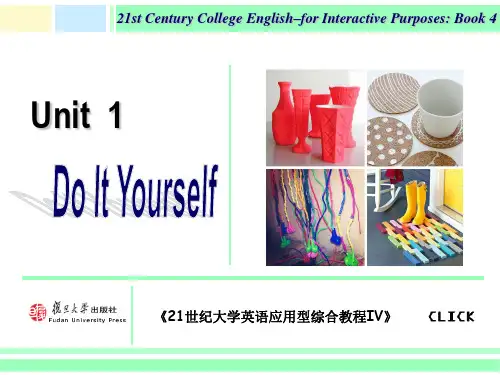
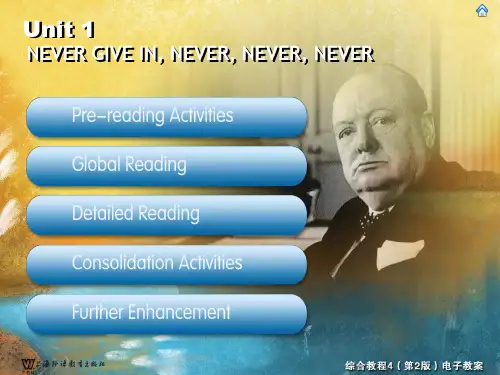
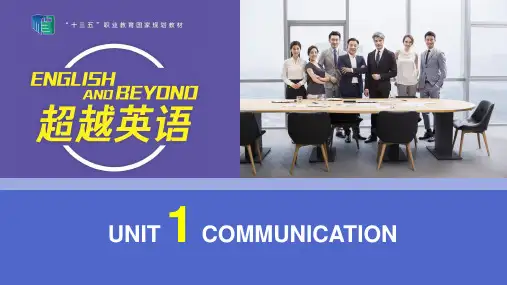

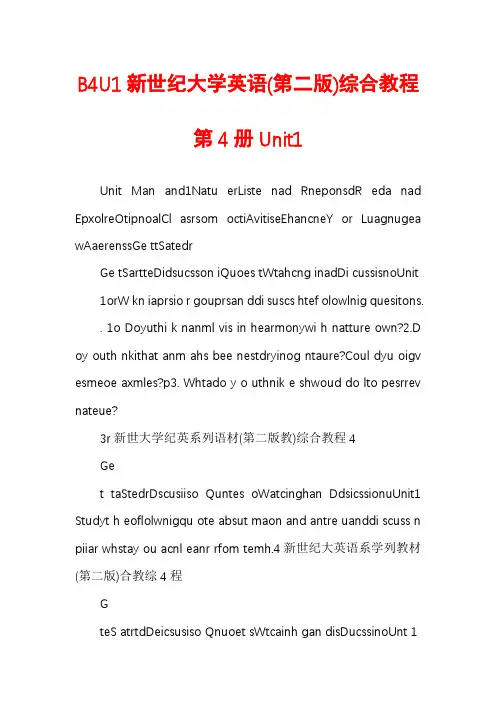
B4U1新世纪大学英语(第二版)综合教程第4册Unit1Unit Man and1Natu erListe nad RneponsdR eda nad EpxolreOtipnoalCl asrsom octiAvitiseEhancneY or Luagnugea wAaerenssGe ttSatedrGe tSartteDidsucsson iQuoes tWtahcng inadDi cussisnoUnit 1orW kn iaprsio r gouprsan ddi suscs htef olowlnig quesitons.. 1o Doyuthi k nanml vis in hearmonywi h natture own?2.D oy outh nkithat anm ahs bee nestdryinog ntaure?Coul dyu oigv esmeoe axmles?p3. Whtado y o uthnik e shwoud do lto pesrrev nateue?3r新世大学纪英系列语材(第二版教)综合教程4Get taStedrDscusiiso Quntes oWatcinghan DdsicssionuUnit1 Studyt h eoflolwnigqu ote absut maon and antre uanddi scuss n piiar whstay ou acnl eanr rfom temh.4新世纪大英语系学列教材(第二版)合教综4程GteS atrtdDeicsusiso Qnuoet sWtcainh gan disDucssinoUnt 1Sitduynat ur,e lov neturea ,satyc oles ot aturne.It iwl nevlr efil you.a ―Frank L olyd Wrgih Itnterpetrtain: oAs n aachrtiec,tW igrt hepmashies tzh eipomrtncea folov ing ad nstuydngi antreu We.s oulhdobserv en tareu ,take cae rfo itan ldvi eni haromn wiyhtit .An d hen tewwi llne verfeel diaspopited nitw ih.tClick iPcutre5新纪大世学英语系教材(列第版)综合二程4教Ge ttarteSdiDsuscion Quoses Wttahcngia d DnsiusciosnUit n1ooL kdep eintonat ue,rand then ouyw ill nudesrtan evedythirgn bette. r―A beltrE nsietniIn teprrtatien:o Asa csietints, iEstnen bieilvee shatta cl osestu y do fnauterw illhelp u besttre udnerstadn hints.gCick lictPrue新6世纪大学英语列系教材(第版二)合教程综4GetSta retdiDscssuoni QoteusW tcaihg nna dDsiuscionsUit 1nW eo dot nees atnruew it hur oeesy,b ut ith ourw unedstrndingasa dnou reahtrs .― Wlliim Haazlitt Itnerpetariotn A:sa wriet, Hazlirtt rguseu s otlove a d appreniacet natreuh ear and tsulo.lCic kPitcru7新世e大学英语系纪列材(第教版)二合教综4程GettaSrtedDiscusiosn Quote Watschinga d nDicussisnoUin t1Teh ighhetsp uposre i st haove no purpoe as atll. hTsip tuson ein a ccrd oitwhn aurt,ein h er manne rfoopera tino ―. Jhno CgeaIn etpretratin:oMa ’s nidelal fi ei tos e bitengrteadint o anute,rso e shoulw drseeptcn taue ran fdllowo its lwas.CilckPic uter8新世纪大英学系语列教材第(版二)合综程4教Gt etSatrdeisDcssuino uQtos eWtchangia d DincsssuoinUnti1 Watch te fhloloinw gidev olicp “f Itehwo rdlwa ms bry 6e drges e a”nd od he tatsksth a tfolol:cwicl kheer新世纪9大学语英系列材(第二教)综版教程合4eG StatredDtsciusion QsuotesvideoUnt i1Wachtig and niscDussion1 F.lli inthe ismsin gwrod acsocrdignt ohwta oyuh er afro tmhe ivdo ecli.pI fht weolr darwm bys 6edgree,s for m adstincea hte ____ oc_aen masy papare rbiht blgu, eub ttheya r meairnewas tealdns Des.res t____ marc_ harossc cnoitents liken oncuerqigna mirse.__ __________Nat urladi asstes rbcemo comemn eovets.nSo m eo the fwrlo’d gseat crtieisa re__ __ _lf oode and dabndoand.eItfemerpaurtessoa by r 6edgree swtiihn______________ lse thas a nectnury , e’wre oign to gafe nctoinhg elsshant ag lobl aiwepo utcl.cikh ree10新纪世大学英语列教材系第二版)综(教合4程GteStar teDiscudsison uQtose aWthing can DdsiuscsoinnUit 1. 2hWa to doy utink hrae othe porssblie conequenscse fo aw armr celiate?m (Oep.)ncilk chere 11新世纪大英学语系列教材(二版第综)教程4合Listen nad RepondsWord Ban kaskTO en Tsk aTowUint1 marin a. eo, nefa,rli vig nn, iro btaiond erfm the seo (近a)的;海海(产)生的isfehr n. y apra to thfe se asude of trehb uinsseso f catchin geasf sh 近i海渔场 e hxusatvt .sue p uomcleptey l完,用尽用2新1纪大世英语系列学教(材第二)综合版程教4Liset nnd aRspenodWodrBan kTa sk Oen Tsa kwoTUint1edangenr v.tca ues dnagre t 使o遭害危,危及xceesise av.t oo umhc; to orget;a gingo byoedn wha ts reasinoaleb o rirht 过多g,过的分,过度的的s tarvaiont . nU[ suf]efirngor dathef orm alk cf ofoo d挨,饥饿;饿饿死1 新世纪3大学语英列教材(系第版二)综合教4程iLtsn enda eRposndWrdo BnakTa skOne Ta s kTowUint 1Chooe shetb et snsawr to each oef th fellowongi qesuiont scacroind tg ohet nfiormtaoincont aied nn ithe listneng ipasaseg.14新世纪学英大系列语教(第二材)版综教合程4Lstein adnR epondWsord BnkaT sakO ne TskaTwoUn i 1t1 W.at is thhemain id e oa thef apssage A? T)hei mortapnc eo fsefoad soppluie.s ) TheB ifshh rvase int he NtorthA ltntaci.C )hT eecdlin ein ifh sspuplis ienthe se . aD) Th iepmroanct oefprot cteig nea sesrurcoe.s15新世大学纪英语列系材教第(二)版综合程教4istLe nad RnepsndoWro dBakn Tsk aOe nasT TkowUnit12 .W htad d ipopel ineE ruoe anp Admrieacin t eh1 9h cettnuy trinkh baotuma rie resnuocers? )A Teh yhouthtgth t maraneire soruec wese raloms exhatusetd B) .hey Thotugth hatt amire nreousres cwer seerousli yestdryoe. Cd)They tho ght tuah tamirn reseoucrs weer eunimiltd.eD) Tehy thouht gtha martin ersouecesrwe eren adgnerde.世新纪学大英语系列教(第材版)综合教程二461Lisetnan dRespon dWord Bnk Task Onae Tska TowUint1 3Wh. ayerthe t rheatst fosi horm elaarinmg htanth etreath sot naiaml snd bardsi A?)B cauee sifsh sia muh ceende dofo derourcs. eB) ecauseB plenytof f sihis kil led very yeear .) CBecusa eifshi st ehon y liedt orfm ay neppoel. D)B eause tce seh fasheiier arse ogngito e exbhautsde.17新世纪大英学系语教列(材第版二)综合程4教iLtesn nda RspoenWodd BankrTa s OkenTask wTonit U14.H w mochuf ihs is havestre ind th Noeth rAltnatc iverye yae? A)r 21b liilo ponnus. dB)1 2mlliion opunds .C) 0 b2liiolnpo nus. D)d 02 mlilinopoun ds1.8新纪大学世语英系列材教第二版)综合(程4教iLtesn nd ResaponWord daBk Tansk neOTask TwoU ni 1t5. Wht aarninw dog cseintsis givt eint h eapssga?eA) Ntaraul esrurcoe swli lbee haxused withti thn nexe fet wyeas.rB )iFshreser ves iwllbe edtsoyred iwthin he nexttfew yea srb eacue of secessivxe ifhsnig .)CPeo pel nis omep atrsof t e world wihll fcae tsavariot nebacue sf toeh roudhgt.D)Peop l’sede mando f nihs iwl dellcine n iose mprts afo th ewoldr.19新纪世学英语系大教材列第(版二)合综程4。
新标准大学英语综合教程4教师用书Unit1新标准大学英语综合教程4 Unit 1Active reading (1)Looking for a job after university? First, get off the sofaBackground informationAbout the passage: This is an article by an Education Correspondent, Alexandra Blair, published in September 20XX年in The Times, a long-established British quality newspaper. In Europe generally, and inBritain in particular, for a number of years there has been a rising number of students who go to universityand therefore more new graduates seeking employment. However, for many graduates finding a job became harder in 20XX年C20XX年because the economic downturn Cthen a recession C meant that many employers werereducing their workforce. After their final exams, some students rested in the summer before looking for jobsand then they found that it was difficult to find employmentin their field or at the level they wanted. Thearticle addresses the problems of such new graduates who might be stuck at home and advises their parentsto be there for their children (ie to be available if their children want to talk about the problem or if theyneed help). The article recommends finding work in a bar or supermarket rather than sitting unemployed at home since this is more likely to lead to better employment later. The style is partly of a report, but alsoof a humorous comment for light entertainment (seen in the jokey language and problem-solving advice toparents).Why finding a job in 20XX年is so difficult for university graduates?Universities in Europe, particularly in Britain, have expanded greatly in the last fifteen years (over 45% ofyoung adults now go on to higher education), so there are more graduates looking for jobs. This competitivesituation became a lot worse in 20XX年onwards with the credit crunch and economic depression, which meant that there were fewer jobs available and a rise inunemployment. Thus new graduates have to be active to seek a job, they need to fill in many application forms and try to get job interviews: they won’t findemployment by lying on the sofa at home.Culture pointshonours degree: Traditionally, in the British university system, BA and BSc honours degrees are awardedin different categories: a first class degree (written using Roman numbers as I), a second (divided into twosubcategories, written as IIii and IIii, which are called “a two one” and “a two two”), a third(written III) anda pass degree. Most people get a second. There are also ordinary degrees with more general courses of studywithout these categories.Generation Y and Grunt: The main idea here is that there is a succession of different generations orcohorts of adults who come into the workforce in North America which are given different informal namesto characterize them. First, “Baby boomers” were born in the great increase (the boom) of birt hs after WorldWar II (1946C1960), followed by “Generation X” people (born 1960C1980) who were said to bring newattitudes of being independent, informal, entrepreneurial, and expected to get skills and have a career beforethem. “GenerationY” or the “Millenial Generation” (born 1980s and 1990s and becoming adult in the newmillenium) are now making up an increasing percentage of the workforce; they are said to be spoilt by dotingparents, to have structured lives, to be used to teamwork and diverse people in a multicultural society. Inthe passage, this generation is now becoming (morphing into) Generation Grunt, which is an ironic namereferring to repetitive, low status, routine or mindless work Cthis may be the only work available to somegraduates, who may have to take very ordinary jobs to get experience before they find something more suitable. “Grunt” also refers to coarse behaviour or bad manners and to the deep sound that is made by a pig;when people “grunt” they express disgust but do not communi cate with words C this may be how the parents of new graduates think their children communicate withthem!A comprehensive refers to a British type of secondary school which became popular in the1960s. Before thatthere were academic “grammar schools” and more general “secondary modern” schools for those who didnot pass the grammar school entrance tests, but the comprehensive schools were designed for all students ina social philosophy of bringing diverse students together whether they were academic or not. Those studentswho went to a comprehensive school probably felt that had to study particularly hard (I worked my backsideoff) to get to university, compared to those who went to grammar schools where all students were academic Ccomprehensive students felt they had to struggle to get to university.Chicken suit This refers to a large yellow costume that someone wears which makes the person look like agiant chicken. Before he became a famous actor, Brad Pitt once dressed in such a costume when he had a jobadvertising for a restaurant called El Pollo Loco (The Crazy Chicken’ in Spanish) C the job meant that he hadto walk around the streets like a chicken to attract customers to come to the restaurant.Language points1 Those memories of forking out thousands of pounds a year so that he could eat well and go to the odd party, began to fade. Until now. (Para 1)The parents paid a lot of money for their son’s university fees and living expenses (so that he could eatwell) and for occasional social events Cat graduation these memories of money were mostly forgotten because the parents were proud. But now the parents are thinking of money again because the son doesn’t have a job and doesn’t seem to be actively seeking one.2 This former scion of Generation Y has morphed overnight into a member of Generation Grunt. (Para 2)The distinguished son of Generation X (of the parents’ generation who worked hard, got jobs, and hadgood careers and expected their son to do the same) has changed into a member of Generation Grunt C hedoesn’t seem to communicate much, lies around and doesn’t get a job (or can only do a low status routingjob).3 I passed the exams, but at the interviews they accused me of being ‘too detached’ and talking inlanguage that was ‘too technocratic’, which I didn’t think possible, but obviously it is. (Para 5)He passed the entrance exams for a government post, but he was criticized in the selection interviews: They said he was detached (not personally involved) and too technocratic (he used the language of atechnical expert or high authority). As a new graduate he probably wanted to show his expertise in hislanguage so he can’t u nderstand this criticism.4 For the rest it is 9-to-5 “chilling” before heading to the pub. (Para 6)The others who do not have a routine low status job (like stacking goods on a supermarket shelf) chill outall day (they spend their time casually relaxing Cthey don’t look for work) and go to pub for a drink in theevening.5 I went to a comprehensive and I worked my bac kside off to go to a good university …(Para 6) He went to a school forstudents of all abilities (not to a special school for academic students) and so hehad to work very hard to enter a good university: Your backside means your bottom Cthe part of your body that you sit on Cto work your backside off is informal and it means you work very hard indeed.6 … bu t having worked full-time since leaving school herself, she and her husband find it tricky toadvise him on how to proceed. (Para 7)The mother has always had a full-time job (presumably the father is also working full-time), so she doesnot have relevant personal experience. For her, it is tricky to give advice (difficult to do).7 Carry on life as normal and don’t allow them to abuse your bank accoun t or sap your reserve of emotional energy. (Para 11) The advice from Gael Lindenfield here is that parents should live as usual. They should neither let theirchildren spend the parents’ money unnecessarily, nor let the problem take away all their energy andemotions. Sap their reserve means use up their store of emotional energy.8 After that the son or daughter needs to be nudged firmly back into the saddle. (Para 12) Then the parents should gently push their children firmly so that they get back into control of their lives.Reading and understanding2 Choose the best answer to the questions.Teaching tipsGo over the correct answers with Ss and ask them to explain why the other answers are wrong (See below).1 Why hasn’t Jack Goodwin got a job yet?(a) He doesn’t have a very good degree.(No, he has a 2:1 which is considered a good degree. )(b) He refuses to apply for jobs with low salaries.(He feels he should get a better job after studying at university.)(c) It isn’t easy to get a job in the current fi nancial climate.(This may be true but the passage does not mention this.)(d) He prefers to stay at home and help his family.(No, he doesn’t seem to be helping his family: he watches TV and talks to friends.)2 How does he spend a typical day?(a) Doing a temporary job.(No, some of his friends are working in temporary jobs but he doesn’t want to do this.)(b) Watching television.(He watches TV a lot.)(c) Queuing up in the university careers service.(No, he went there once but he didn’t want to queu e s o he walked away.)(d) Preparing for the next job interview.(No, he doesn’t seem to be preparing for interviews.)3 How do most of his friends spend the day?(a) They do nothing all day and go to the pub in the evening.(All except one of them do nothing except chill, then they go to the pub.)(b) They do outdoor activities such as sailing.(No, none of them seem to do outdoor activities; there is no mention of sailing.)(c) They are forced to work by their parents.(No, only one of them has been forced out to stack shelves by his parents; the others seem to be like Jack.)(d) They do part-time jobs such as working in a bar.(No, the text mentions bar work but none of Jack’s friends seem to do this work.)4 How are Jack’s parents helping him?(a) By looking for jobs for him.(No, Jack has tried to get a job himself; there’s nothing here about his parents helping him look for ajob.)(b) By paying for a trip to South America.(No, although he is going on a three-week trip to South America, the passage does not say that Jack’s parents have paid for this.)(c) By gradually making him more financially aware.(The passage does not say so explicitly, but this is the implication about the cut-off point after thetrip when he may be expected to pay rent and contribute to the household bills.)(d) By threatening to throw him out of the house.(No, they haven’t threatened to do this, but they definitely want him to work after he gets back fromhis trip.)5 What does Gael Lindenfield say about Jack’s parents?(a) They ha ve not really understood Jack’s problems.(No, she doesn’t say this; she says they must balance being positive with not making life too comfortable. This doesn’t mean they haven’t understood Jack’s problems.)(b) They have made life too comfortable for Jack.(No, she says they must balance comfort with being positive. This doesn’t necessarily mean that they have already made life too comfortable for Jack.)(c) The approach they have chosen is the right one.(She says they have struck exactly the right note.)(d) They need help from a psychologist.(No, she doesn’t say this.)6 What do Whoopi Goldberg, Bruce Willis and Brad Pitt have in common?(a) They all did bar work before going to university.(No, we don’t know from the passage if any of them did this.)(b) They took part in protests against nuclear power plants.(No, we don’t know is any of them did this)(c) They learnt to act by dressing up as giant chickens.(No, only Brad Pitt did this.)(d) They all did temporary jobs at one stage in their lives.(This is right, although they all had completely different temporary jobs.)Dealing with unfamiliar words3 Match the words in the box with their definitions.1 to make progress by moving to the next stage in a series of actions or events (proceed)2 the process of changing from one situation, form or state to another (transition)3 not feeling involved with someone or something in a close or emotional way (detached)4 referring to something which will happen soon (upcoming)5 to be sitting still in a position that is not upright (slump)6 to return to a previous state or way of behaving (revert)7 to say what happened (recount)4 Complete the paragraph with the correct form of the words in Activity 3.It isn’t easy to make the (1) transition from a busy university student to an unemployed young adult (2) slumped on a bar stool or half watching a mindless television show, wondering if and how their careeris going to (3) proceed. Many people who have experienceda long period of inactivity like this, when (4) recounting how they felt at the time, refer to the same strange psychological effect. As the days pass,they begin to feel (5) detached from any sense of pressure to go and look for a job, and tend to regard (6) upcoming interviews as if they were not very important. Typically, back at home after three or fouryears away, they (7) revert to old habits, start seeing old friends, and, in many cases, become dependentagain on their parents.5 Replace the underlined words with the correct form of the words in the box. You may need to make other changes.1 I went to a mixed-ability secondary school just outside London. (comprehensive)2 I got stopped by a policeman who asked to see my driving licence. (cop)3 Have you seen this beautiful from the air view of Oxford? (aerial)4 Isabel tightly her bag as she walked down the corridor towards the office. (clutched)5 You should speak to Toby; he’s an supporter of flexibleworking hours. (advocate)6 I hurt my leg badly a couple of months ago, and it still hasn’t got b e tter completely. (healed) 6 Answer the questions about the words.1 Is a dead-end job one with (a) exciting prospects, or (b) no future?2 Is a tricky problem (a) difficult, or (b) easy to solve?3 If an activity saps all your energy, do you feel (a) tired, or(b) more active than usual?4 Does a pushy person try to (a) persuade you to do something you don’t want to, or (b) help you bylistening to what you have to say?5 If you feel apathy, do you want to (a) change the world, or(b) stay at home and do nothing?7 Answer the questions about the phrases.1 Is fork out (a) a formal, or (b) an informal way of saying to pay for something?2 If you are in the same boat as another person, are you (a) making the same journey together, or(b) inthe same difficult or unpleasant situation?3 If you feel you have come full circle, do you (a) feel you are back where you started, or (b) feela senseof satisfaction because you have completed something?4 If someone takes a soft line, do they deal with a person (a) in a kind and sympathetic way, or (b) in alazy way without making a decision?5 If you strike the right note about something, are you expressing yourself (a) well, or (b) badly?6 If you do something by all means, do you (a) try your best to do it, or (b) not care about it?7 If you nudge someone back into the saddle, are you encouraging them to (a) take responsibility again, or(b) take it easy?8 If you talk through a problem with someone, do you (a) examine it carefully and sensitively, or(b) referto it quickly and then change the subject?Reading and interpreting8 Answer the questions.1 “Will he ever get a job?” Who is asking this question? Whatmood does it express?The parents are asking this because the paragraph is addressed to parents (earlier it sa ys “your graduateson”). The mood seems to express patience or resignation because the word “ever” suggests that gettinga job will take a long time.2 Who describes Generation Y as “rebels without a cause”? Is it a fair description?This is the writer’s d escription to indicate that this generation is rebelling against parents or society,but they have nothing particular to rebel against. This doesn’t seem very fair because the students aretrying to find work Cit is just that they don’t like their parents nagging them. So they are a bit rebelliousagainst their parents, but no more than that.3 Jack “walked int o the university careers service and straight back out again”. What does this suggestabout Jack’s character?It suggests that Jack is not very determined. As soon as he saw the queue he left without waiting andwithout trying to ask about jobs or careers.4 Jack spent the summer “hiding”. Hiding from what? Why are quotation marks used?Probably this means he was hiding from the world of work, staying at home and not looking for a job. The quotation marks tell us that he wasn’t literally hiding, he just spent a lot of time at home.5 How is Mrs Goodwin’s point of view affected by her own personal experience?In one way her experience hasn’t affected he r attitude: She left school and went immediately to a job(without going to university) and has been working full-time since then and yet she is sympathetic andtakes a soft line.6 How is Lindenfield’s point of view affected by her own personal experience?Her personal experience was that she worked in a bar before finding her first proper job as an aerial photographic assistant. So she says such work is a great networking opportunity. If new graduates aregood at such work and bright, cheerful and polite, they willsoon be promoted. Her personal experience thus reflects C or perhaps has created C her point of view.7 What would the first two paragraphs have focused on if they had been presented from the point of viewof the students rather than the parents?The first two paragraphs would have focused on the need for the new graduates to rest for a bit after their hard studies. It is OK for students to relax with the TV or to socialize with friends for a while, thenthey can start a serious search for employment after that.Active reading (2)If you ask meBackground informationThis is an informal and personalized account of an economics graduate who gets a job in a pub for a year and then has an opportunity to be successful (a lucky break). She works in a L ondon pub called “The Salisbury”or “The Marquis Salisbury”, named after someone who was the British Prime Minister three times between1885 and 1902 and whose family once owned the pub’s land. The 100 year old pub is in Leadenhall Street, just off the CharingCross Road and Leicester Square. Daytime customers can get a pub lunch and evening customers include many office workers and theatre goers (the pub is near many West End theatres). The interior of this pub is dazzling, with large mirrors, cut glass an d a mahog any décor.British pubs are often named after famous people (Robin Hood, The Duke of Wellington) or royalty (The Queen’s Arms, the Prince of Wales) or historical symbols (The Rose and Crown to represent King Edward III, The Royal Oak to represent King Charles II who once hid in a large oak tree). Other names often includecolours and animals (The Red Bull, The Black Horse, The Golden Lion, The Swan) or symbols of traditional trades (The Compasses for carpenters, The Three Hammers for blacksmiths, The Three Tuns forwinemakers).As the pub is a social place to meet as well as a place to get a drink, people often play games like dominoesor darts or join a quiz or competition. A common expression is to “go down the pub” or “go round to thelocal” (bot h meaning to go to the local pub).Culture pointspub in London: A pub is a place where people go for a drink and to meet friends and socialize. People canplay games Csuch as darts, cards, dominoes Cin a pub and pubs often have quiz nights, with prizes for thewinners, and live music (See also Background information) The Salisbury is a well-known pub in central London (See also Background information) London School of Economics is a distinguished university in central London, famous for social sciences. Language points1 If you ask me, real life is not all it’s cracked up to be. (Para 1)In my opinion (If you ask me introduces an opinion), real life is not everything that people say it is. If athing is cracked up to be, people normally praise it but in the opinion of the speaker they are wrong.2 … spending money when you don’t have any is dead easy. (Para 7)Dead here means very. For example, we can say dead tired (exhausted), a dead loss (a complete loss oruseless), a dead weight (very heavy, difficult to lift).3 What were the odds on anyone being so nice? (Para 11)What are the chances that someone would be so nice? The writer is emphasizing here that such kindness isvery unusual.4 … looking back after all these years, you only need one or two break s in your life to succeed. (Para 13)A break here means a chance to be successful. A lucky break is an unexpected opportunity. Reading and understanding2 Choose the best answer to the questions.1 What did the writer want to do after finishing her degree?(a) To do an MA at the London School of Economics.(b) To earn some money to pay off her loan.(c) To start working as soon as possible.(d) To return home and help her mother.2 Why did she ask for a job in The Salisbury?(a) She was hungry and thirsty.(b) She thought it would lead to better things.(c) She was a friend of the landlord.(d) She had the idea when she saw the landlord working.3 What did she buy with her first salary?(a) A bunch of flowers.(b) A CD and a plant for the flat she lived in.(c) A ham sandwich and a glass of beer.(d) She didn’t have any money left after paying the bills.4 Why did Tony give her 20,000?(a) He found out it was her birthday and wanted to help.(b) He trusted her and thought it would help her.(c) He wanted her to leave the pub and work for him.(d) He was secretly in love with her.5 What did she do with the money?(a) She used it to pay for her course at the LSE.(b) She lost a lot of it in the 20XX年stock market crash.(c) She invested it and paid back Tony and other investors.(d) She used it to start her own business.6 Why was Tony pleased when she repaid the loan?(a) He had had an accident and needed the money for a wheelchair.(b) It meant that he would be able to see her again.(c) It proved that he had been right to invest in her.(d) She paid back the loan with a lot of interest.3 Work in pairs and answer the questions.What do we know about the writer’s:1 family background?Her mother had worked hard for 15 years to support her education but couldn’t afford any further support. Her fath er wasn’t around most of the time. He didn’t have any money because he spent it ongambling on dog racing or drinking in pubs.2 career as a student?She had a good degree in economics and wanted to study for a masters course at the London School of Economics.3 ambition?She wanted to get a job in finance or investments in London because then she would be able to use herdegree.4 appreciation of other people?She appreciated Mike’s friendliness with customers and his s kill, and she appreciated Tony as a nice person; later she appreciated the trust of Tony and his friends5 love life?We don’t know much about this, except that she doesn’t like boys to hassle her. She thinks they areimmature.6 financial expertise?It must be quite good: She invested the 20,000 and made enough profit to pay the money back with interest and set up her own company.7 sense of responsibility?She has a strong sense of responsibility because she paid back the money to the investors and paid theman annual interest for the loan.8 philosophy of life?She believes that you should work hard; you may need one or two breaks to succeed but you should know how to use the breaks. You should be honest and responsible with people who trust you. Dealing with unfamiliar words4 Match the words in the box with their definitions.1 funny or entertaining (amusing)2 used for emphasizing that something good has happened, especially because of good luck (fortunately)3 an amount of money that a person, business or country borrows, usually from a bank (loan)4 to take an amount or number from a total (deduct)5 the most exciting, impressive, or interesting part of anevent (highlight)6 to show that you understand someone’s problems (sympathize)7 needing a lot of time, ability, and energy (demanding)5 Complete the conversation with the correct form of the words in Activity 4.Teaching tipsWhen Ss have completed the blanks with the correct form of the appropriate words, ask them to practice reading the dialogue, trying to make their reading sound as conversational as possible. Choose a pair toperform their reading to the class. The class listens and gives the performing pair a rating on a scale of 1-10for fluency and naturalness.A After three years at univers ity, I’m now quite heavily in debt.B I (1) sympathize with you, I know what it’s like to have financial problems. But (2) fortunately I didn’tneed to take out a student (3) loan when I was at university, because I had a part-time job.A What did you do?B I worked in a restaurant at weekends.A That must have been very (4) demanding.B Yes, it was. I had to get the right balance between work and study. But the other people who worked there were good fun to be with, so it was quite (5) amusing too. The (6) highlight of the weekend wasalways Saturday night when we worked overtime.A But I don’t expect you made a lot of money?B No, there wasn’t much after they’d (7) deducted tax and pension contributions. But it was enough tokeep me going.6 Replace the underlined words with the correct form of the words in the box. You may need to make other changes.1 When I was at college I kept all my personal things in an old cupboard.2 A lot of people who leave university before getting a degree end up in good jobs.3 I think she’ll get a good degree, but I wouldn’t risk my money on the exact result.4 The money I spent at college was more than what I earned in my part-time job.5 The chances of my being offered a job after that interview must be quite remote.6 Our business has done very well since we changed our advertising.7 I think telling the truth and not cheating is always the best policy.Key: (1) belongings (2) dropouts (3) gamble (4) exceeded (5) odds(6) has thrived (7) honesty7 Answer the questions about the words and expressions.1 If something is not all it’s cracked up to be, is it (a) valid and interesting, or (b) just a little bitdisappointing?2 If someone keeps banging on about something, are you likely to be (a) interested in, or (b) bored bywhat they say?3 If there is a lot of hassle in your life, are you likely to feel (a) stressed, or (b) relaxed?4 If something happens out of the blue, is it (a) unexpected, or (b) part of your plan?5 If you say you ended up in a particular job, do you suggestthat (a) you have fulfilled your ambition, or(b) it happened almost by chance?6 Are the regulars in a pub (a) the customers who come very often, or (b) the food the pub offers mostoften?7 If something is dead easy, is it (a) very easy, or (b) not easy at all?8 If you treat someone to something, do you (a) buy something nice for them, or (b) behave badly to them?9 If you cheer a place up, do you (a) make the place look brighter, or (b) make the people in the placehappier?Reading and interpreting8 Look at the sentences from the passage and identify the style features.1 Twelve years at school and three years at university, teachers banging on about opportunities in the bigwide world beyond our sheltered life as students, and what do I find?This shows the informality of an incomplete sentence in the first part, the use of an informal expression。